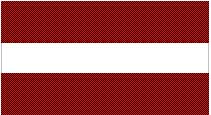 |
Number of versions: 2
Edition: August 21, 2002
Update: March 30, 2009
|

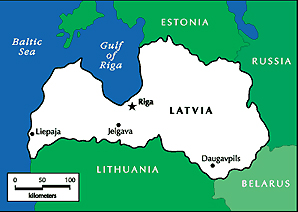 As far as is known there has never been any inland Monopoly-like game
manufactured and it is Parker/Hasbro who introduced the Monopoly game in this
country, like in the other Baltic states, not until 2001. Of course the streets
and stations are those of its capital Riga. Already a few
years later, in 2008, Ralph Anspach's Anti-Monopoly was launched in this
country as well.
As far as is known there has never been any inland Monopoly-like game
manufactured and it is Parker/Hasbro who introduced the Monopoly game in this
country, like in the other Baltic states, not until 2001. Of course the streets
and stations are those of its capital Riga. Already a few
years later, in 2008, Ralph Anspach's Anti-Monopoly was launched in this
country as well.
From Starts on all properties are:
Maskavas iela - Sabiedriskais fonds (Community Chest) - Deglava iela -
Ienakuma nodoklis (Income Tax) - Dzelzcela
stacija "Ziemelblazma" (Station) - Pernavas
iela - Iespeja (Chance) -
Karla Ulmana gatve - Pulkveza
Brieza iela - Cietuma/Apmeklejums (In
Jail/Just visiting) - Stabu iela - Elektroapgade -
Matisa iela - Krasta
iela - Dzelzcela stacija "Zasulauks" - Tallinas
iela - Sabiedriskais fonds - Kr.
Barona iela - Gertrudes iela - Bezmaksas
laukumins (Free Parking) - Dzirnavu
iela - Iespeja - Elizabetes iela -
Terbatas iela - Dzelzcela stacija
"Janavarti" - Kr. Valdemara iela
- Brivibas iela - Udensapgade (Water Works) -
Caka iela - Dodieties uz cietumu (Go to Jail) -
Smilsu iela - Audeju
iela - Sabiedriskais fonds - Valnu iela
- Dzelzcela stacija "Jugla" - Iespeja - Kalku
iela - Pelnas nodoklis (Super Tax) and Doma
laukums.
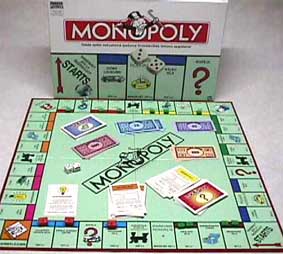 Edition:
Standard, ref. 030114535632
Edition:
Standard, ref. 030114535632
Publisher: Parker/Hasbro Inc. - Sia Anvol - Riga - 2001
Dimensions of the box: 26.8 x 40.3 x 5.3 cm
of the board: 25.2 x 25.2 cm
The game:
In the second half of the ninetees Parker/Hasbro have introduced this
capitalistic game with great energy in many countries of the former Eastbloc.
And this introduction is strongly continued, because in 2001 the Baltic states
were the next. After Lithuania Latvia and Estonia immediately got their first
"official" Monopoly edition.
Although in other European countries the issues of 2001
already show the red Monopoly bar with Mr.Monopoly-with-red-bow-tie
on the board's midfield (as well as on the lid), this edition still has the black-bar-with-Uncle-Pennybags-and-frame,
like it is on the boards since 1985.
In this "standard" box is of course the red
plastic "banker's tray" again with holes for the 7 banknotes and
property deeds still present with the banker.
The game board is folded in four and fits, when stored,
precisely on the banker's tray. The back of the board is as usual red,
the playside is blue green. This
edition is of course also manufactured in Ireland and therefore shows the
picture of the "laughing family" at the bottom of the box.
On the game board the Iespeja cards with nice red
back are as usual near the Starts corner while the Sabiedriskais fonds cards with their nice blue
back are near the Free Parking corner.
The banknotes are of the one side printed new model, i.e. with
a black ribbon and "MONOPOLY with Uncle Pennybags" in the upper part of the
circle and, almost invisible, the remark "1996 Tonka Corporation",
(ref.1004535 OOC). The
currency is Ls
(= Lat) and the denominations are resp.: 1
- 5 - 10
- 20 - 50
- 100 and 500.
The 10 tokens are of light metal and are the well-known: hat -
shoe - car - boat - dog - wheelbarrow - rider-on-a-horse - thimble - iron and
canon.
The houses
and hotels
are of non-transparant plastic and have all an overhanging roof with an
excentric chimney.
Both dice are white with black pips.
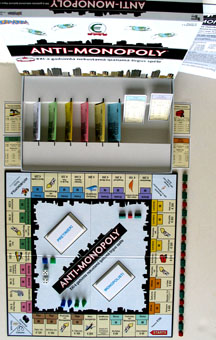 Edition: Anti-Monopoly, Ref.
778
Edition: Anti-Monopoly, Ref.
778
"XXI-ā
gadsimta nekustamā īpašumā tirgus spēle"
Publisher:Kadabra-Kaunas-LT/University Games-NL - 2008
Dimensions of the box: 26.8 x 40.2 cm
The game:
On the bottom of the box is, next to a color picture of the game, a short explanation of the origin of the game and
how to play it.
The translation reads:
"An update of the "monopoly" folk game invented by Elizabeth Magie a 100 years ago. A twist right out of
today's headlines: free market competitors clash with ruthless monopolists.
In the real business world, competitors and monopolists work
hard to increase their incomes - but they go about it in different ways.
Competitors sell more goods at a fair price to make a fair profit. Monopolists,
on the other hand, destroy their competitors first so that they can fix prices
above fair, competitive levels to make excessive profits.
Other real estate trading games are a jumble of competition and monopolism. In Anti-Monopoly®, however, players are diveded into two
groups: competitors and monopolists before the game starts. The players follow
different rules (depending on their status) in their quest for big money. This
method of play is a revolutionary idea for games. In all other games players
follow one set of rules. It is this idea of movement and choice which allows Anti-Monopoly®
to be the first and only game in history which clearly distinguishes between the
actions of competitors and monopolists."
Ralph Anspach is a Professor Emeritus of Economics
at San Francisco State University who invented this Anti-Monopoly game. He based
his creation on the monopoly folkgame which was invented by
Elizabeth Magie in 1904 and was played extensively in the Eastern United States
between 1904 and 1935. Players in the monopoly folkgame buy and trade properties
to monopolize color groupings.His game transforms the folk game into a battle
between competitors and monopolists and it retains the antimonopoly message of
the creators of monopoly. Quaker teachers (members of the Society of
Friends in Atlantic City, N.J.) transformed the folkgame into what is now played
as Monopoly.
Charles B. Darrow stole the knowledge of the game and its rules from these
Quakers, commercialized it, and falsely claimed that he had invented it to
get an invention patent. He licensed it to Parker Brothers which popularized the
legend of Darrow the Inventor.. .
Ralph Anspach discovered the truth about the history of Monopoly when he
became a defendant in a ten-year long law suit filed by Parker Brothers. He
eventually won that law suit, read his book "Monopolygate".
Anti-Monopoly®'s specialty is, as said, its principle
players have to choose between 2 play methods: that of the Monopolists
and the Competitors. However, which part you will prefer, all players
have equal chances to win, although they play according to different
Rules. So Monopolists for example, can only build houses and hotels when
they have a monopoly position in a town (what is the case
already when the
player owns 2 of 3 streets), while Competitors may build on each property,
independent of they own a whole city or one single street.
On the solid board with black back the streets of 8 cities
are from Starts onwards:
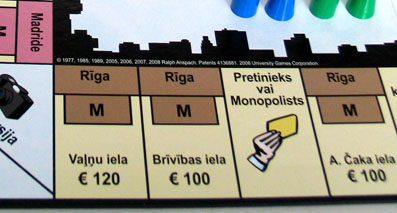 Roma: Corso Impero -
Pretinieks vai Monopolists - Via Roma - Ienākuma nodoklis (Income
Tax)
Roma: Corso Impero -
Pretinieks vai Monopolists - Via Roma - Ienākuma nodoklis (Income
Tax)
Rīga: A.Čaka iela - Pretinieks vai Monopolists
- Brīvības iela - Vaļņu iela
Ekskursija/Cenu karš (price war)/Cietums (Jail)
Madride: Plaza Mayor -
Elektrotīkli (Electric
Company) - Gran Via - Paseo de la
Castellana
Amsterdama: Dam - Pretinieks vai Monopolists
- Leidsestraat - Kalverstraat
Anti-Monopola fonds (Anti-Monopoly foundation)
Parīze: Rue
la Fayette -Pretinieks vai Monopolists - Rue de la Paix -
Champs-Élysées
Brisele: Grote Markt - Hoogstraat -
Gāzes vada cauruļu sistēma (Gas company) -
Nieuwstraat
It is of course also necessary the two types of players to be taken into
account of on the property deeds. That is why they have 2 columns
for the prices: at the left for the Pretiniekiem
and at the right side those for the Monopolistiem.
The back side of the cards is also to show the property to be mortgaged. In this
situation the card must be given the bank, however, the owner can any
moment buy it back from the bank. This is also said on the back side of the
cards.
There are only 6 banknotes, printed in grey
on colored paper, in the denominations: 1
- 5 - 10
- 50 - 100
and 500.
There are only 6 plastic tokens, viz. of each a green
and blue one:cone, pyramid and a pawn like a "cilinder
with sphere".
The set goes with 35 houses and 15 hotels
of plastic, with roof rim and chimney. (Note: The Pretinieki must place their houses and/or hotels on the name of the field, while the
Monopolisti must situate them on the "H"-spot.)
Both dice are white with black pips.
The first version of this 21st edition was published in 2005 in
the USA, soon followed by that of many European countries.
This edition was "Made in Spain".
The price of this edition was at the introduction € 19.95.